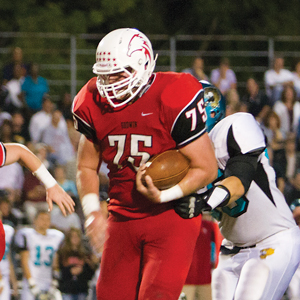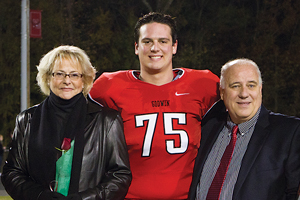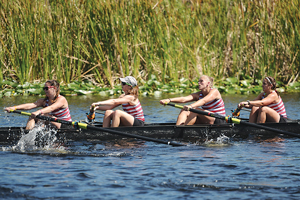 On fields and courts and in pools across the country, millions of kids dream of scoring big scholarships to college – and moving on to fame and fortune after that.
On fields and courts and in pools across the country, millions of kids dream of scoring big scholarships to college – and moving on to fame and fortune after that.
They see dollar signs and the big contracts in their heads,” said Bob Foley, a Richmond-area basketball coach who runs various sports programs for kids. “But did you know that three out of every 10,000 high school basketball players go to the NBA? Eight out of every 10,000 football players make it to the NFL.
“It’s not a very good percentage. But kids grow up with those dreams.” And for a talented and lucky few, it happens. “I tell the kids, you have to love the game to play at that level,” said Foley.
Foley, who offers a seminar titled The Realities of Recruiting to educate parents and athletes about the college recruiting process, doesn’t want athletes to stop dreaming, but does want them to understand the reality of college-level athletics. Foley has a quarter century of coaching experience – at schools including Colorado, Penn State, and Richmond – and lived through the recruitment experience with his own children.
“If you are sure that college athletics is what you want to do and a job you want to undertake, then you have to be prepared for all that comes with it,” said Anastasia Stodolski, a graduate of Manchester High School attending Florida Tech in Jacksonville on a rowing scholarship.
You hear stories about the perks of being a star athlete, but the reality is that being a college athlete is tough. Not only do you have the pressure of game day, you’ve got practice, studying and other commitments. There’s a good chance you’ll miss some holidays at home, major life events for friends and family and even the chance to enjoy college social life. “When everybody else is going out on a Friday night, you have to stay in because you have curfew or you have a game in the morning,” said Foley. “You don’t get to do the things that other students do.”
“The life of a college athlete is different from a regular student in many ways,” said Stodolski. “My day starts at four-fifty in the morning and runs until around tenthirty at night, with practice, lifting, classes, and studying. As a student athlete, I am held to a higher standard than other students, and if I mess up I get punished much more severely. Being a college athlete requires you to be on the top of your game 24-7-365.”

Andrew Stanley, lacrosse coach and associate director of athletics at Collegiate, advises students to first choose a college they want to attend and only then consider the opportunity to play sports – but be ready for a big change. “College athletics are different than high school. The coaches get paid to win.”
Many athletes, however, are used to rigorous schedules and discipline, which can help them navigate the recruitment process as well as prepare them for college.
Eric Tetlow, a football standout at Mills Godwin High School, was heavily recruited and received numerous scholarship offers before committing to Wake Forest. The left tackle approached the recruitment process aggressively.
“The worst thing you can do is sit back and let [colleges] come to you,” said Tetlow, who found off-season sports camps and recruitment websites beneficial. “You have to get your name out, your film out, and your statistics out to as many schools as you can. Not all the schools will like what you have or have a need for your position. Go out, meet the coaches and really try to advertise yourself.” Tetlow, like many others, created his own website to showcase his career.
Mark McQueen, head baseball coach at the University of Richmond, explains that assembling his team is like putting together a jigsaw puzzle. “You have to find the right fit academically and athletically for what you need. Once we find talent, then we have to check into their academics. Then if both those things pass the test, we have to figure out how to make it affordable. If there is somebody we really like, we make an offer. If they come back and say they’d like to come here but can’t afford it, we’ll go back and double-check our figures and see if we can up the offer a little bit more,” said McQueen, who experienced the other side of recruitment and scholarship negotiation when his son was looking at colleges. Like all coaches, McQueen’s ability to offer scholarships is regulated by the NCAA, as is when, and under what conditions, recruiting can occur. Different sports may have different rules and most are constantly changing. Title IX, in effect since 1972, has leveled the financial playing field somewhat, requiring them to offer equal athletic and scholarship opportunities to men and women.
This is important information for parents who have invested thousands of dollars – and hours – each year for their kids to play sports, often with hopes that a big scholarship lies ahead. Unfortunately, that is rarely the case. Most athletes won’t receive a full ride to school; only a few sports such as football or basketball have the resources. A study by Mark Kantrowitz, founder of college website finaid.org, analyzed college sports scholarships in 2007-08 and found that 1.4 percent of students received athletic scholarships, with the average award being $7,855. A college coach, in most cases, must slice and dice limited scholarship money in a way that best serves the athletes and the team. Many students are surprised at the limited scholarship money, although university financial aid offices can help find ways to make up the difference in cost of attendance, said UR’s McQueen.

The coach also has to stretch the money over an athlete’s college career. Stodolski said her scholarship was raised as she improved in her sport (she was selected for the prestigious USRowing Women’s National Team Freshman Camp), but it’s also possible that awards will be reduced. And yes, scholarships can be revoked for academic reasons, violations of NCAA rules, or because of injury. There are no guarantees.
If a young athlete shows promise, it’s important to start early on the track to college sports, said Foley. “The first thing they’d better do is make sure they’re taking the right academic classes.” The NCAA mandates minimum requirements, both for numbers of academic courses and the grade point average in them.
There’s a big advantage to being an outstanding scholar as well as athlete, said Tetlow. “A lot of kids think they just need the bare minimum GPA, like a 2.5, but a lot of schools told me solid academics give you an edge.” A college might look at the top 500 players in the country, he explained, narrow it to 25 based on talent, then narrow it further based on grades. He’s proud that he’s kept a high GPA and taken advanced classes throughout his high school career.
Stodolski, who is studying in Florida Tech’s pre-med program, says that along with academics, time management skills are vital to the success of student athletes. “In the end athletics in college is a great choice, as long as you are able to balance the school-athletics-social life triangle.” And ultimately, college is for education, she said. “As every coach has told me over the years, academics comes before athletics and before all else.”
Lisa Crutchfield is a freelance writer who lives in the West End with her husband and teenage daughter. She last wrote about paying for college in August 2012.
Do You Have What it Takes?
Making a good impression off the field is often as important as what an athlete does on the field. With thousands of athletes vying for limited scholarships, it’s vital to stand out in many ways.
As lacrosse coach at Collegiate School, Andrew Stanley has helped numerous athletes find the right college, but he feels that talent alone isn’t always what it takes for an athletic scholarship. “I honestly believe what sells kids more than anything… is just genuine old-school stuff that Mom and Dad taught us: look people in the eye; be polite and follow up with a hand-written thank you note. It’s about how you differentiate yourself, the way you conduct yourself and the decisions you make off the field.
“Being the right kind of kid is as important as how well you play and how your grades are. One of the first questions a [college] coach will ask me, after we determine if he can play, is ‘do I want him on my team?’ Nobody wants to recruit a kid who’s not going to represent their school or the coach or themselves well,” says Stanley, who is also associate director of admissions at Collegiate.
The NCSA athletic recruiting website offers some tips for recruiting etiquette, including reminders to show maturity throughout the recruiting process. What teens might consider a cool voicemail greeting, email address, or Facebook page could indicate to a coach that the player isn’t serious or could be a source of headaches down the road. It seems obvious, but coaches also appreciate prompt responses, good phone manners, and proper grammar in written correspondence.



